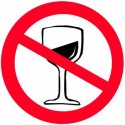Coalition targets underage drinking
Local and national studies show that some young people are reporting taking their first drink at the age of 11. In Auburn, 5 percent of seventh graders have already used alcohol in the last month, according to an Auburn City Schools survey. By ninth grade, that number rises to 15 percent, and by 12th grade nearly 40 percent of seniors have used in alcohol in the last 30 days.
That’s why the Auburn Coalition Advocating for Responsible Environments—Auburn CARES—is targeting sixth graders in an attempt to educate them about the pitfalls of underage alcohol consumption.
“When asked it they had a drink of alcohol in the past year, 11.6 percent of Auburn sixth graders reported that they had, compared to 36.7 percent of ninth graders and over half (57.4 percent) of seniors,” said Kathryn Molnar, prevention environmental coordinator for East Alabama Medical Center and a coalition member.
That’s serious, said Dr. Linda Anz, a local pediatrician who is also a member of Auburn CARES.
“The research shows that young adult’s brains are still developing up until 21 or 22 years of age,” Anz said. “Kids have an undeveloped frontal lobe, which makes them more impulsive and more likely to binge drink.”
In addition, Anz said, kids who start drinking by the age of 15 are five times more likely to abuse or become dependent on alcohol.
“Alcohol can actually damage brain cells, especially in the hippocampus, which is important for memory and the ability to learn,” Anz said. “We especially find this in youngsters who binge drink.”
Because youngsters’ brains are typically less developed, kids who drink are more likely to engage in risky behavior. According to coalition materials, 41 percent of all teen car crashes involve alcohol, as do 32 percent of all teen driving deaths. Alabama has the fifth highest death rate for teen drivers in the U.S., Molnar said.
Alcohol is also believed to be involved in 90 percent of all campus rapes and most episodes of violence on college campuses.
In Auburn, a special concern is the practice of mixing alcohol with so-called “energy drinks,” Molnar said. Alcohol is a central nervous system depressant, she said. When a young person consumes an energy drink crammed with the stimulant caffeine, he or she feels less intoxicated—even though still impaired.
“That’s one of the biggest dangers,” Molnar said. “It’s on our radar because we’re told one out of three kids use energy drinks.”
Matt Bodine, an ACS student who is part of the coalition, said “Monster” is the most popular energy drink in town, and he knows people who consume two or three in a day.
Sometimes, according to coalition literature, kids purposely mix alcohol and energy drinks to create “speedballs” or “AEDs.” Certain combinations have specific names, including a “Bull Blaster, a “Bull-garita” or a “Jager Bomb.”
Some new drinks, such as Sparks, Tilt and Rockstar 21, even package alcohol and caffeine together.
Molnar was at Drake Middle School last week addressing sixth graders as part of a teach-in sponsored by the U.S. Department of Health and Human Services and Scholastic Inc. Fifteen cities across Alabama and hundreds across the U.S. are focusing on sixth graders in trying to raise awareness of the dangers of drinking, she said.
“When parents talk to them about the dangers of underage alcohol use and set clear rules, they listen and are less likely to make risky choices about alcohol,” Molnar said.
She said community culture could be changed, and pointed to the city’s smoke-free ordinance. Auburn City Council member Tom Worden is a member of the coalition, and he said making the city smoke-free went off virtually without a hitch.
“We go not feedback,” he said. “When something goes OK, we don’t hear anything. We heard more about the noise ordinance.”
Molnar said sixth graders are being targeted because, according to surveys, four out of five of them know that alcohol is easy to get.
“Talk to your child about alcohol,” she said. “Sixth graders are still willing to listen to you.”
Last year, the coalition was known as the Auburn Coalition Targeting Underage Drinking and sponsored a community-wide symposium to discuss the issue. This year, sixth graders are being approached directly, and the coalition is placing materials for parents in doctors’ offices around the community.
source: Auburn Villager


